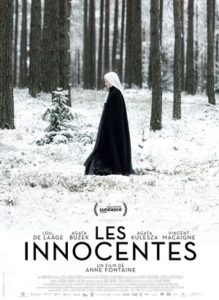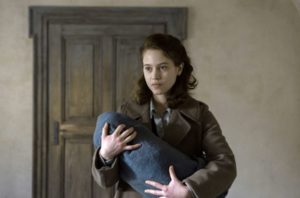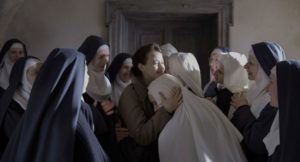 In recent years we’ve been given three foreign films that take as their subject the events in a monastery; “Of Gods and Men” (2010), “Ida” (2013), and this year’s “Le Innocents”. “Of God’s and Men” confronts the outside threat on the community and how its members choose to respond. “Ida” tells a nun’s journey out of her nunnery into the wide word and how she deals with what she sees. But although “Le Innocentes” begins in the cloistered world of the nunnery, the surprise is that that its focus is on an outsider, who finds herself thrust into the strange world of a nunnery on a mission of mercy.
In recent years we’ve been given three foreign films that take as their subject the events in a monastery; “Of Gods and Men” (2010), “Ida” (2013), and this year’s “Le Innocents”. “Of God’s and Men” confronts the outside threat on the community and how its members choose to respond. “Ida” tells a nun’s journey out of her nunnery into the wide word and how she deals with what she sees. But although “Le Innocentes” begins in the cloistered world of the nunnery, the surprise is that that its focus is on an outsider, who finds herself thrust into the strange world of a nunnery on a mission of mercy.
The nunnery is in post-WWII Poland and that outsider is Mathilde (Lou de Laage), a young atheist doctor-in-training serving for the Red Cross. Mathilde is summoned to the secluded community by a desperate nun who reveals their urgent secret: German and Russian soldiers had rapped the women, the majority of whom are now pregnant and in labour. Mathilde’s presence as an outsider amongst this most private community is hardly the first challenge; to the chaste nuns, the physical nature of Mathilde’s assistance and their deep shame in the face of their former chastity threatens a spiritual crisis, demanding great mutual trust and understanding.
 I find myself closely identifying with these three recent films of monastic life. As a Christian, the lifestyle of work, prayer, and worship is appealing. The stark simplicity of their surroundings make for a beautiful cinematic environment. But the stories speak even deeper because I myself was raised in a sort of monastic environment, secluded from the influence of the secular “world”. I grew up homeschooled and lived on a secluded acreage, designed to keep me from the distractions of the internet and interactions with nonbelievers. So stories like “Ida”, exploring what happens when someone leaves this environment, echo my own journey. “Le Innocentes'” emphasis is on what happens when a non-believer enters that world of belief and seclusion, reminding me of my secular friends who enter my life and engage with me in my world of faith. By choosing to focus on the outsider’s journey into this brave new world, the film offers much for Christian communities to ponder on what happens when non-believers interact with us.
I find myself closely identifying with these three recent films of monastic life. As a Christian, the lifestyle of work, prayer, and worship is appealing. The stark simplicity of their surroundings make for a beautiful cinematic environment. But the stories speak even deeper because I myself was raised in a sort of monastic environment, secluded from the influence of the secular “world”. I grew up homeschooled and lived on a secluded acreage, designed to keep me from the distractions of the internet and interactions with nonbelievers. So stories like “Ida”, exploring what happens when someone leaves this environment, echo my own journey. “Le Innocentes'” emphasis is on what happens when a non-believer enters that world of belief and seclusion, reminding me of my secular friends who enter my life and engage with me in my world of faith. By choosing to focus on the outsider’s journey into this brave new world, the film offers much for Christian communities to ponder on what happens when non-believers interact with us.
The movie is beautiful. The cold, winter light is perfectly suited to the austere stone walls of the monastery. The white and black patterns of the trees echo the tunics of the nuns. Their blue cowls match the deep blue eyes of Mathilde and the blue paint in the bustling town she resides in. Beautiful cinematography alone is one thing, but there were many times when my breath was caught first by beauty of the scene and then again when I realised the significance of what it was portraying. In one memorable incident, Mathilde is surrounded by a large group of the nuns, who embrace her with great relief for the help she has brought to the desperate community. The joy in all of their smiles spoke to their mutual sisterhood that transcends their differing beliefs.
Unlike both “Of Gods and Men” and “Ida”, the final third of “Le Innocentes” felt rushed and uncertain, fumbling the impact of what could have been a much more memorable ending. (Compare its use of the piece of music ‘On the Nature of Daylight’ to how “Arrival” used that same music to much greater effect.) Despite this shortcoming, it’s an evocative film that’s well worth watching, especially as you ask the following question. What happens when you bring an outsider into the inner workings of your community during a situation that requires a mutual vulnerability and trust?
 Mathilde’s presence in the community amidst this crisis reveals the weaknesses of the nuns’ beliefs, along with the failure of the Mother Superior’s choices. But Mathilde also gets a prolonged glimpse of the nuns’ quiet strength in the face of their deep suffering and great uncertainty. The situation requires great bravery and self-sacrifice of both parties. There is no room for secrets and little occasion for privacy. But what are the results of this crisis on the community? Despite these terrible events and because of inclusion of Mathilde, the nunnery is shown as a place of far greater joy and life. It has become a much richer community.
Mathilde’s presence in the community amidst this crisis reveals the weaknesses of the nuns’ beliefs, along with the failure of the Mother Superior’s choices. But Mathilde also gets a prolonged glimpse of the nuns’ quiet strength in the face of their deep suffering and great uncertainty. The situation requires great bravery and self-sacrifice of both parties. There is no room for secrets and little occasion for privacy. But what are the results of this crisis on the community? Despite these terrible events and because of inclusion of Mathilde, the nunnery is shown as a place of far greater joy and life. It has become a much richer community.


